Books about Grounded Theory Research Design
by Janet Salmons, PhD., Research Community Manager for SAGE Methodspace
Research design is the SAGE Methodspace focus for the first quarter of 2023. Selecting the methodology is an essential piece of research design.
A previous post introduced grounded theory and offered open-access examples from SAGE Journals. I asked two SAGE authors these questions: why is grounded theory an important methodology to consider now? What makes grounded theory unique? They responded:
Grounded theory is more relevant than ever in our fast-changing world. By allowing us to investigating questions of process, grounded theory provides for quality improvement of services and interactions between human and non-human actors across a diverse range of fields. Grounded theory research designs are highly flexible, enabling both qualitative and quantitative data to be used. Theoretical sampling allows for an iterative and organic approach to data generation, that is analysed through our own philosophical lens and informed by theoretical sensitivity. This iterative and organic approach allows us to produce theories that explain how phenomena is experienced by those to whom it matters.
- Melanie Birks and Jane Mills
Certainly questions of process are of concern as we try to understand how and why questions, and new theoretical constructs are needed to make sense of changing situations in personal or global contexts. In this post you can find the excellent new edition by Birks and Mills, and a collection of SAGE books that will help you learn more about this methodology.
SAGE Books about Grounded Theory
Use the code MSPACEQ123 for a 20% discount, valid until March 31, 2023.
Grounded Theory A Practical Guide, Third Edition (2023)
by Melanie Birks, Jane Mills
The student-focused guide to grounded theory, this book takes you step by step through the whole research process, from creating a research proposal to sharing your findings. Clear, accessible and applied, this book will help you get to grips with the philosophy of grounded theory, understand the nuts and bolts of designing and carrying out your research project, and manage any hurdles along the way.
The SAGE Handbook of Grounded Theory (2019)
by Antony Bryant and Kathy Charmaz
Building on the success of the bestselling The SAGE Handbook of Grounded Theory (2007), this title provides a much-needed and up-to-date overview, integrating some revised and updated chapters with new ones exploring recent developments in grounded theory and research methods in general. The highly-acclaimed editors have once again brought together a team of leading academics from a wide range of disciplines, perspectives and countries. This is a method-defining resource for advanced students and researchers across the social sciences.
The Varieties of Grounded Theory
by Antony Bryant
The Varieties of Grounded Theory explores the range and depth of grounded theory methodology, and the ways in which discussions in the field have developed and expanded in recent years. Bryant provides a jargon-free overview of grounded theory terminology, whilst examining the impact of recent technological and theoretical advances on how it is currently practiced. Increasingly popular outside of its original settings, grounded theory is now a core method for business & management, criminology, politics, geography and psychology. This book provides a global interdisciplinary perspective on the method's utility today, and complements The SAGE Handbook of Current Developments in Grounded Theory (April 2019).
Constructing Grounded Theory, Second Edition (2014)
by Kathy Charmaz
Kathy Charmaz presents the definitive guide to doing grounded theory from a constructivist perspective. This second edition of her groundbreaking text retains the accessibility and warmth of the first edition whilst introducing cutting edge examples and practical tips. This is a seminal title for anyone serious about understanding and doing grounded theory research. Find a preview and sample chapter here.
Situational Analysis: Grounded Theory After the Interpretive Turn, Second Edition (2017)
by Adele E. Clarke, Carrie Friese, Rachel S. Washburn
Situational Analysis: Grounded Theory After the Interpretive Turn offers an innovative extension of grounded theory useful in qualitative research projects that draws on interviews, observations, and visual, narrative, and historical discourse materials. To engage the dense complexities of real world situations, Situational Analysis (SA) braids together Strauss's ecological social worlds/arenas theory, Foucault’s discourse analysis, and Deleuze and Guattari’s rhizomes and assemblages. In SA, the situation itself becomes the fundamental unit of analysis. Using extensive examples, the authors discuss getting started, how to create three kinds of maps emphasizing differences and relationality (situational maps, social world/arena maps, and positional maps), the kinds of analytic work they accomplish, and how to write up the results centered on the distinctive strengths of the method. The book will serve as an invaluable resource for advanced undergraduate and graduate-level students, as well as professional researchers and consultants from diverse backgrounds pursuing qualitative projects.
Doing Grounded Theory (2018)
by Uwe Flick
This short, easy to read introduction to grounded theory will help you to employ the method in your research project. Uwe Flick discusses each stage of the process of doing grounded theory research, including formulating a research question through analysis of data, theoretical sampling, sorting and saturation, data collection, coding and forming theories from data.
Rediscovering Grounded Theory (2013)
by Barry Gibson, Jan Hartman
Rediscovering Grounded Theory is a bold re-evaluation of the origins of grounded theory, a philosophical clarification of its key ideas and a presentation of the most effective way to use its techniques in your research. It answers questions such as 'What should grounded theory look like?', 'How do I recognise grounded theory?' and 'How do I produce good grounded theory?' by returning to the original ideas as they were presented by Glaser and Strauss.
Classic Grounded Theory: Applications With Qualitative and Quantitative Data
by Judith A. Holton, Isabelle Walsh
Classic Grounded Theory: Applications With Qualitative and Quantitative Data provides practical “how to” guidance for doing grounded theory (GT) using the classic approach articulated by Barney Glaser. The authors emphasize the philosophical flexibility of classic GT as a “full package” approach that can be applied to any study and any type of data where the goal is to discover and generate a conceptually integrated theory. Drawing on the experiences of novice researchers who have participated in GT troubleshooting seminars, the book provides step-by-step guidance on undertaking a research study that stays true to the classic GT practice paradigm.
Grounded Theory for Qualitative Research: A Practical Guide, Second Edition (2023)
by Cathy Urquhart
Straightforward and accessible, this pragmatic guide takes you step-by-step through doing grounded theory research. With hands-on advice focussed around designing real projects, it demonstrates best practice for integrating theory building and methods.
Conducting Classic Grounded Theory for Business and Management Students
by Isabelle Walsh, Judith A. Holton, Gaëtan Mourmant
Grounded theory (GT) is a popular method of research, allowing for the systematic generation of new theories or areas of enquiry from data that have themselves been systematically obtained. As a highly versatile approach, it can span qualitative, quantitative, and mixed methods. This book is an invaluable guide to using GT effectively in business and management dissertations, and offers practical guidance and insight into how to successfully transcribe and analyse data using the GT approach in your own research project.





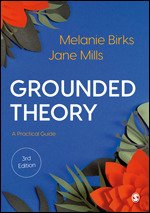
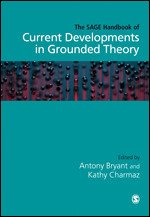
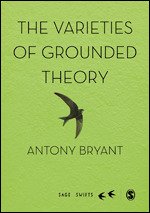
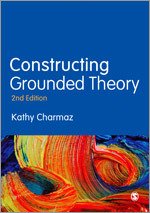
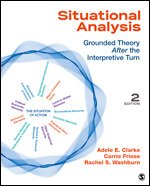
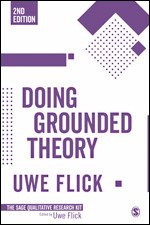
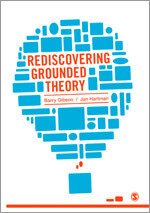
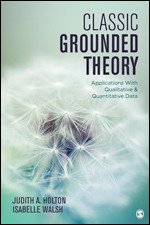
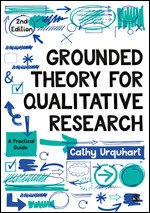
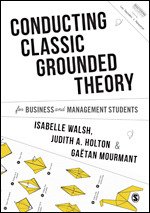
Qualitative data analysis varies by methodology. Discover diverse ways to analyze data for grounded theory studies in these open access articles.